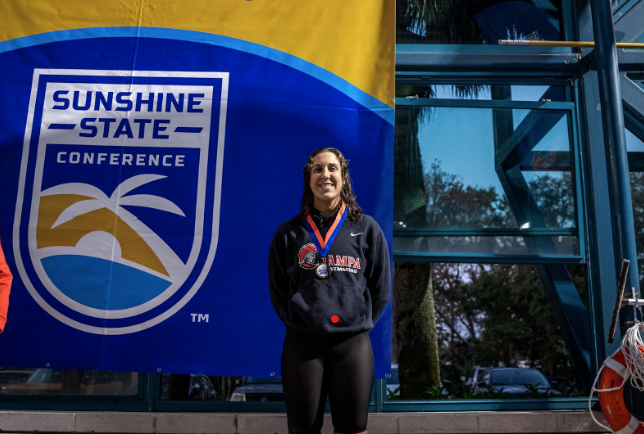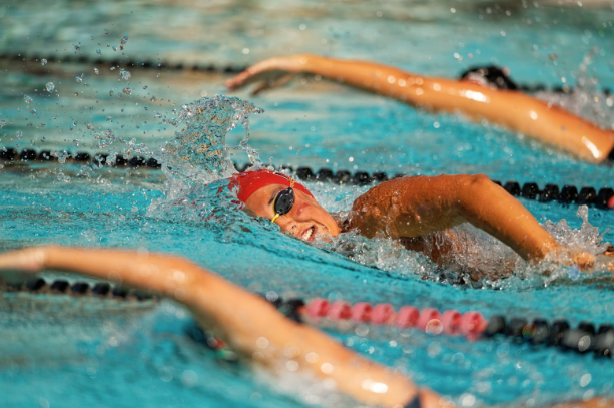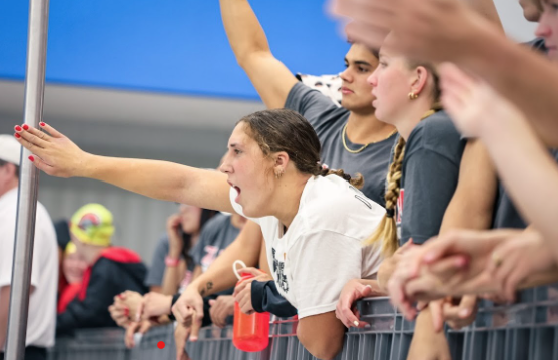Dear Swim
I don’t mean control as it has fully taken over, but control as in my practice schedule determines my classes, free time, and most recently my mental health.

A personal reflection on sport and mental health written by Holly Wessel, a collegiate swimmer and former Inward Athlete Intern.
Dear Swim,
I never thought going into my last year of competitive swim I would have come off the previous season thinking I wouldn’t finish out all four years of college swimming. From when I first started learning to swim at three years old, and now being twenty-one, swimming has been a sport that has controlled the past eighteen years of my life. I don’t mean control as it has fully taken over, but control as in my practice schedule determines my classes, free time, and most recently my mental health. Swimming has always been fun, it was my safe place and where I could have my mind at ease. However, during the past few years, it has become more than just that. It was a bunch of pressure on myself to the point where I wanted to stop because I did not think it was good for my mental health anymore. I was not performing well, and I thought the best thing for me was to stop, however, now I want to go into my final season just having fun.
I think I always noticed the amount of pressure I put on myself at a younger age. During club swim, especially championship meets, when I didn’t perform the best, I thought I could, I would get upset with myself. I would feel that I let people down if I was not going personal bests or placing as high as my best times would let me place. When I got to high school, I grew out of that a little because I knew I was always doing my best and giving it all to my team. My main goal during my four years of high school was to get recruited to swim in college, which ended up happening because I’m now at University of Tampa (UT) fulfilling my goal.

I went into my freshman year at UT wanting to experience, learn, and grow as much as I could. Throughout my freshman year, I achieved all the goals I set out for myself. I made my NCAA B cut during my first semester, I won a dual meet event, I made finals and then placed 3rd at conference, and I competed at NCAA’s. I was hoping to take everything I learned during freshman year to be able to grow and get better sophomore year. The goals were the same, and in addition, I wanted to make finals at NCAA’s and become an All-American.
The way I thought sophomore year would go was only about half of the story. I went into the season having my goals and knowing the NCAAs was at IUPUI in Indianapolis, IN was special. This is a pool I’ve been swimming at since I was about eight years old, I have always had luck at it, and just in general will forever be one of my favorite pools to swim in. Because of that, I truly wanted to make NCAA’s and do the best I could there. I felt I found my place during practices on the team, however, I was struggling in meets and I believe it was visible to everyone who I surrounded myself with, especially my coaches. If I’m being truly honest, I cannot pinpoint where the season started to turn and my mindset around swimming started to turn, but in November, I realized I needed to make a change.
After talking with teammates and coaches, I decided to reach out to University of Tampa’s Sports Therapist. I realized I needed to talk to someone when I was upset at every single meet when I was going faster during practice. I was tired of crying because I was not happy with how I was swimming. I was not happy even though I kept pretending I was okay because I never wanted people to worry about me when I knew they all had their own issues and problems going on in their lives. I knew that I needed to put myself first for once to get back to where I once was before. I finally got to my breaking point where I didn’t want to cry or be hard on myself after every single swim I had. It was getting unhealthy and if I wanted to complete four years of being a collegiate student athlete, I needed to talk to someone.

Talking with someone turned out to be such a good thing during sophomore year. My friends and family who have known me before I came to Tampa were proud of me for finally talking to a therapist. Throughout the season, I still wasn’t performing at meets the way I was performing during practice. Midseason came around and that was an extremely hard meet. After the 3rd day, I was swimming the 500 freestyles in finals, and it was not a good swim for me. I broke down after this race to my coach. But, my coach took me off the pool deck when he had other swimmers in the water to make sure I was okay. That was one moment that I will always appreciate from him because it showed me just how much he cares about how I am doing mentally. I went home for the break and took days off in order to come back stronger. I knew what I was capable of and I still wanted to achieve the goals I had set for myself at the beginning of the season.
After I got back to Tampa, I was having weekly meetings with my therapist. We talked about practices but also about my friends, family, social life, school, etc just anything that was going on. One thing I have learned was if there was some negative outside factor, even just the slightest one, it can affect how I’m swimming. This doesn’t mean it will be during just meets but it could be during practices, however I was still struggling at meets. I never ended up having a fantastic dual meet compared to my freshman year meets, but during the second semester before conference, I was seeing little improvements, and I noticed that I wasn’t getting as upset with myself as I did in the previous semester.
Leading up to the conference meet, I won’t lie, I was terrified. I knew I had one maybe two opportunities in order to make NCAAs, but at this point, I just had to do my best, know the time and effort I put into the season, and believe in myself once again to perform at the level I needed to perform at. My coaches still had faith in how my season would end because I ended up on the 800 freestyle B relay on the first night of the meet. I cannot tell you what the order was or what my time was, however, I can say I dove in and swam one of my best 200 freestyle times. It was the first event of the entire meet and the energy was insane and I finally got out of the pool happy for probably the first time that season. I needed that race to happen the way it did to show myself that I am still able to race the way I know I can. This momentum was carried throughout the rest of the meet. I made my NCAA B cut in the 1000 the next day. I swam one of my best 200 freestyles the day after that. I “A” finaled in the 500 freestyle the next day as well as making the B cut. And finally, the last day for the 1650, I just went out and swam it like I always do with my mindset of “f*** it”. I was happy once again with how I was swimming but also with the results of how I was swimming.
To Be Continued....
Part II. will be shared Wednesday, January 15th.
Thank you to Holly for sharing her personal story vulnerably with us to share here on Inward Athlete.
If you or someone you know is struggling with mental health, it's important to know that you're not alone, and help is available. There are numerous resources offering support, from hotlines and counseling services to online platforms and community groups. Reaching out can be the first step toward healing and finding the right support. Consider speaking to a professional, contacting a mental health hotline, or exploring mental health organizations that provide guidance, coping strategies, and assistance. Your well-being matters, and support is just a step away.
Here are some important mental health hotline numbers you can call for support:
National Suicide Prevention Lifeline:
988
(Available 24/7 for mental health crises, including suicide prevention)
Crisis Text Line:
Text HELLO to 741741
(24/7 texting support for mental health crises)
National Helpline for Mental Health:
1-800-662-HELP (1-800-662-4357)
(24/7 confidential assistance for mental health and substance use issues)
The Trevor Project (LGBTQ+ Crisis Support):
1-866-488-7386
(Available 24/7 for LGBTQ+ youth in crisis)
